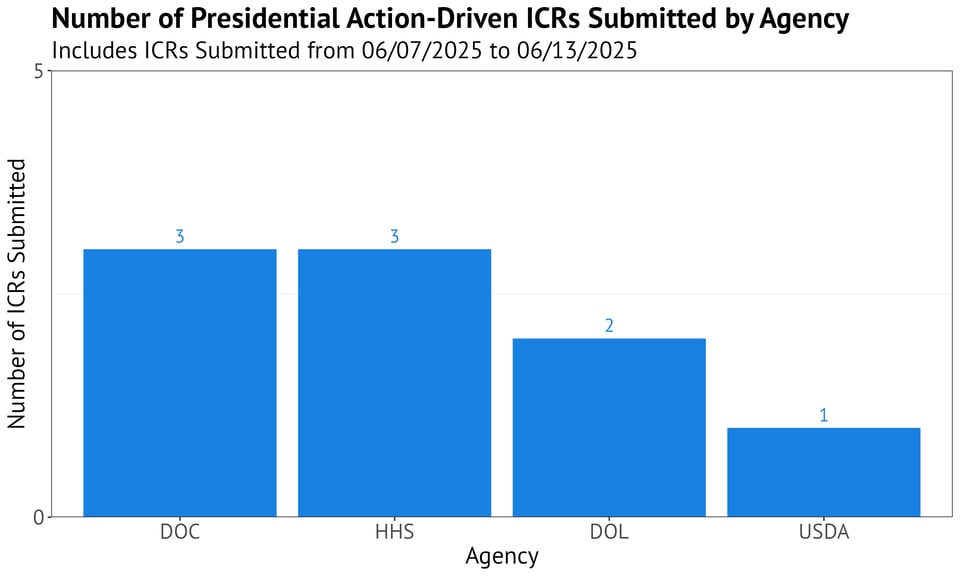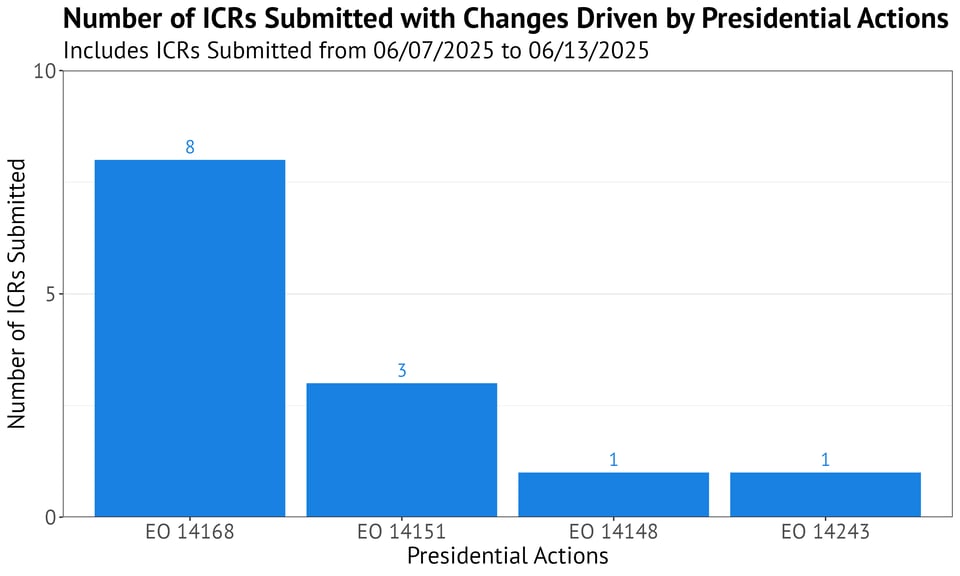Uncovering Changes to Federal Data: 06/07/2025 – 06/13/2025 ICR Roundup
by Melanie Klein
Since January 20, 2025, new Presidential Actions, such as Executive Orders and Proclamations, have required federal agencies to subtly adjust what information they gather and how they ask for it. This is especially true when it comes to language about gender and diversity, equity, and inclusion (DEI). Federal data collections leave a digital trail on RegInfo.gov as they evolve, but some footprints are easier to spot than others.
Tracking ICR Activity
Between June 7 and June 13, 2025, 116 Information Collection Requests (ICRs) were submitted. Of those, a total of 9 ICRs were submitted specifically in response to Presidential Actions.
7 of the 9 ICRs requested a “no material or nonsubstantive change to a currently approved collection.” This means minor changes can be made without extending the collection’s expiration date. Because these revisions don’t trigger a public comment period or a notice in the Federal Register, they can easily fly under the radar and move through a fast approval process.
The Department of Commerce (DOC) and the Department of Health and Human Services (HHS) stood at the forefront of these changes, each having submitted 3 ICRs in response to Presidential Actions. The Department of Labor (DOL) followed with 2 ICRs, and then the Department of Agriculture (USDA) with 1 ICR.

Presidential Actions Behind These Changes
Carefully reviewing each ICR from June 7 to June 13, 2025, allowed us to pinpoint exactly which Presidential Actions agencies used to justify their proposed changes:
8 ICRs driven by EO 14168: Defending Women from Gender Ideology Extremism and Restoring Biological Truth to the Federal Government, January 20, 2025
3 ICRs driven by EO 14151: Ending Radical and Wasteful Government DEI Programs and Preferencing, January 20, 2025
1 ICR driven by EO 14148: Initial Rescissions of Harmful Executive Orders and Actions, January 20, 2025
1 ICR driven by EO 14243: Stopping Waste, Fraud, and Abuse by Eliminating Information Silos, March 20, 2025

Notable Example
One notable example illustrating how Presidential Actions have shaped recent updates to data collections involves USDA requesting access to sensitive SNAP data from state systems.
On June 11, 2025, USDA submitted a nonsubstantive change request for the Supplemental Nutrition Assistance Program (SNAP). Citing EO 14243 on eliminating information silos, the change memo stated that it would “leverage data-sharing across federal and state systems to identify and rectify any ineligible, duplicate, or fraudulent SNAP enrollments and transactions.” The memo emphasized that the primary goals are to ensure that SNAP benefits are issued only to those who are eligible and are used lawfully. This verification process includes reviewing eligibility based on immigration status.
This change introduces a new system, the USDA/FNS-15 “National SNAP Information Database,” which will collect personally identifiable information from State SNAP agencies. This includes, but is not limited to, individuals’ names, birthdates, addresses, and Social Security numbers.
This change is not unexpected as USDA published a letter on May 6th, 2025, in which the agency agreed to comply with EO 14243 by seeking “unfettered access to comprehensive data from all State programs that receive Federal funding,” including from third-party databases. The letter indicated USDA would require states to work with their payment processors to submit records to identify SNAP applicants and recipients from January 1, 2020, to the present. It states that “this is the only way to eliminate ‘bureaucratic duplication and inefficiency’ and enhance ‘the Government’s ability to detect overpayments and fraud’.”
However, the implementation of this change has raised significant public concern. Prior to the ICR submission, USDA was sued on May 22, 2025, for allegedly not following the correct privacy procedures when collecting data. The lawsuit revealed that USDA is developing a new System of Records Notice (SORN), and the recent ICR notes that the new system “will not be exempt from any provisions of the Privacy Act.”
Given the heightened media attention surrounding SNAP data, it is notable that this new data system was submitted as a nonsubstantive ICR which bypassed the public comment period. Moreover, the Office of Management and Budget (OMB) approved the request without modification on the same day it was submitted. Situations like this underscore the importance of closely reviewing and flagging ICRs that have a significant impact on millions of people across the country.
How to Stay Informed
Our ICR tracker at dataindex.us is updated daily with newly scraped data to surface these changes as they are proposed. We review every ICR on a weekly basis so you don’t have to, and our Tuesday blog posts highlight the latest developments. These quiet shifts in the federal data landscape may seem small, but they deserve our attention.
Sign up for blog updates and site alerts to follow the latest changes, and follow us on Bluesky and LinkedIn.